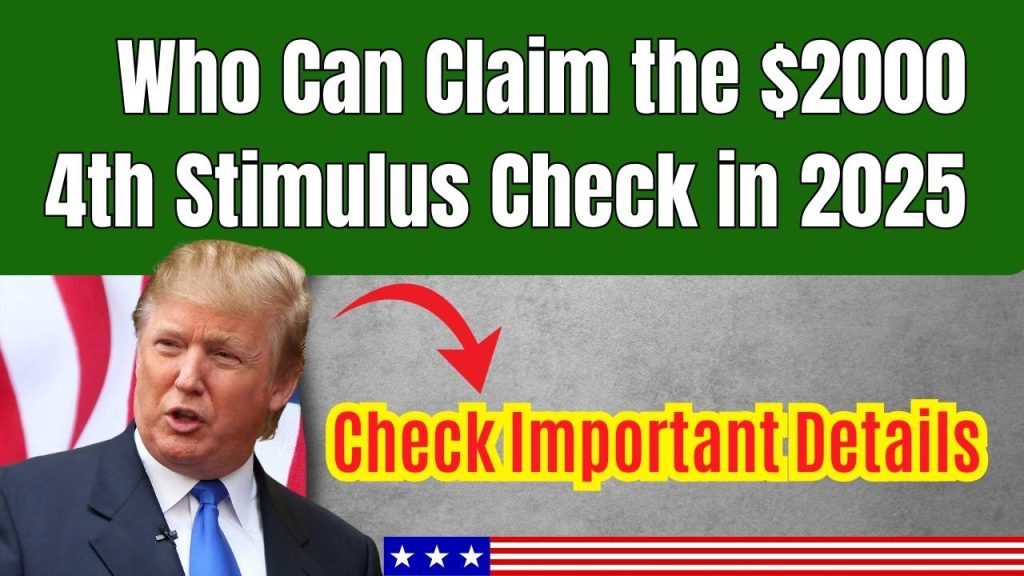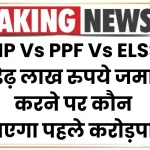
4th Stimulus Check in 2025: In 2025, many Americans are asking, “Who can claim the $2,000 fourth stimulus check?” While the buzz around a potential new federal stimulus payment continues, it’s essential to separate fact from fiction. This guide will provide clear, accurate information about eligibility, alternative relief options, and how to ensure you don’t miss out on any financial support you qualify for. Let’s explore all the details so you can stay informed and make the best decisions for your financial future.
4th Stimulus Check in 2025
| Topic | Details |
|---|---|
| Eligibility for $2,000 Check | As of now, no federal $2,000 check is scheduled for 2025. |
| Alternative Relief Options | Recovery Rebate Credit for missed prior payments; state-level programs available. |
| Deadline for Action | File tax returns by May 17, 2024, for 2020 payments, or April 15, 2025, for 2021 payments. |
| Official Resource | IRS.gov |
Although a $2,000 fourth stimulus check in 2025 is not a reality, Americans have various options to access financial relief. From claiming missed payments via the Recovery Rebate Credit to exploring state-level programs, it’s essential to stay informed and take timely action. The key is understanding your eligibility, filing necessary paperwork, and relying on trusted resources like IRS.gov for guidance. Remember, staying proactive can help secure the financial support you deserve.
Current Federal Stimulus Status
As of early 2025, there is no new federal $2,000 stimulus payment approved. The federal government has completed its distribution of three previous Economic Impact Payments (EIPs) during the COVID-19 pandemic. These payments were instrumental in helping millions of Americans during challenging times. However, those who missed out on earlier payments may still have a chance to claim them through the Recovery Rebate Credit. Let’s break down what this means and how you can take advantage of available options.
What Is the Recovery Rebate Credit?
The Recovery Rebate Credit allows individuals who didn’t receive their full stimulus payments in 2020 or 2021 to claim these amounts as a tax credit. This can be a lifeline for people who:
- Didn’t file taxes in 2020 or 2021 due to low income.
- Experienced income or dependency changes that impacted their eligibility.
- Were unaware of prior stimulus programs.
For example, if you earned less income in 2020 or had a new dependent, you might qualify for a larger credit than what you initially received.
How to Claim the Credit
- Check Your Eligibility: Visit the IRS’s Get My Payment tool to verify whether you received full payments.
- File Your Tax Return: Even if you typically don’t file taxes, you must file a federal tax return for the relevant year to claim the credit.
- Meet the Deadlines:
- File for 2020 payments by May 17, 2024.
- File for 2021 payments by April 15, 2025.
- Use IRS Free File: Access free tax preparation services on IRS Free File.
By taking these steps, you can ensure you receive the financial relief you’re entitled to, even if you missed earlier opportunities.
State-Level Relief Programs
While no federal fourth stimulus is currently in place, some states offer their own relief programs to help residents combat inflation, housing costs, and other financial strains. These programs vary widely in terms of eligibility, benefits, and application processes, but they can provide meaningful support to those in need.
California Middle-Class Tax Refund
Eligible California residents may receive payments ranging from $200 to $1,050, depending on income and family size. This program aims to offset rising costs of living, particularly in housing and energy. Visit California Franchise Tax Board for details and application requirements.
Colorado Taxpayer Rebate
In Colorado, taxpayers can qualify for up to $750 per individual or $1,500 per couple. These rebates are automatically issued to eligible residents who file state taxes. Learn more at Colorado Department of Revenue.
Check Your State’s Programs
Many states provide additional support through programs like rent assistance, energy subsidies, or food aid. For example:
- New York: Rent Relief Program for low-income tenants.
- Texas: Energy subsidies for families struggling with utility bills.
- Florida: Disaster recovery grants for hurricane-affected residents.
Visit your state’s tax or social services department for specific programs, deadlines, and application processes.
Beware of Scams and Misinformation
Recent rumors on social media have led to confusion about new stimulus checks. The IRS has clarified that no federal stimulus payments are currently being issued in 2025. This misinformation can lead to frustration and, worse, financial scams targeting vulnerable individuals.
How to Stay Safe
- Rely on Official Sources: Always check IRS.gov or your state’s official website for accurate information.
- Beware of Phishing Emails: The IRS never contacts taxpayers via email or text for sensitive information.
- Consult a Tax Professional: When in doubt, seek advice from a certified accountant or tax preparer.
- Avoid Sharing Personal Information: Never share your Social Security number, bank account details, or other sensitive data with unsolicited contacts.
By staying vigilant, you can protect yourself from scams and ensure you only act on verified information.
Get $5,180 and $967 Social Security Payments in January 2025: Check Application Process
$943 + $1415 Social Security Payments in January 2025: Check Eligibility and Payment Dates
$1200 Federal Payments Coming Soon: Check Eligibility and Deposit Date Details
FAQs About 4th Stimulus Check in 2025
1. Is there a $2,000 stimulus check in 2025?
No, there is no federal $2,000 stimulus check approved for 2025. Claims about such payments are misinformation and should be verified through official sources.
2. How can I get financial relief if I missed earlier stimulus checks?
You can claim missed payments through the Recovery Rebate Credit by filing a federal tax return for the relevant year. Ensure you meet the deadlines to receive the credit.
3. Are there any state-specific stimulus programs?
Yes, some states, like California and Colorado, offer their own relief programs. Other states may provide aid for rent, energy, or disaster recovery. Check your state’s website for details.
4. What should I do to avoid scams?
Verify all information through official channels like IRS.gov and avoid sharing personal details with unsolicited contacts or emails.
5. Can I still get help if I don’t usually file taxes?
Yes. Non-filers can use IRS Free File to claim missed stimulus payments through the Recovery Rebate Credit. Assistance is available for free through IRS tools.
6. Are there other federal programs I can apply for?
While a fourth stimulus check is not available, federal programs like SNAP, WIC, and Medicaid continue to provide support to eligible individuals and families. Explore these options through Benefits.gov.










